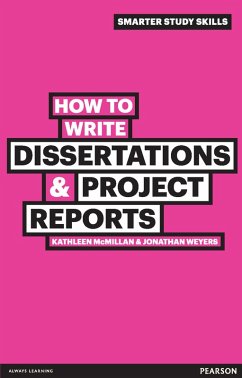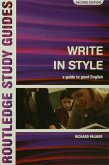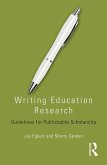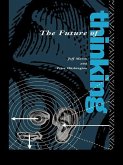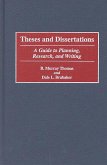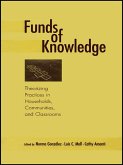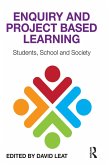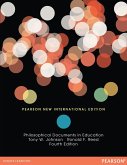7,99 €
7,99 €
inkl. MwSt.
Sofort per Download lieferbar

4 °P sammeln
7,99 €
Als Download kaufen

7,99 €
inkl. MwSt.
Sofort per Download lieferbar

4 °P sammeln
Jetzt verschenken
Alle Infos zum eBook verschenken
7,99 €
inkl. MwSt.
Sofort per Download lieferbar
Alle Infos zum eBook verschenken

4 °P sammeln
- Format: PDF
- Merkliste
- Auf die Merkliste
- Bewerten Bewerten
- Teilen
- Produkt teilen
- Produkterinnerung
- Produkterinnerung

Bitte loggen Sie sich zunächst in Ihr Kundenkonto ein oder registrieren Sie sich bei
bücher.de, um das eBook-Abo tolino select nutzen zu können.
Hier können Sie sich einloggen
Hier können Sie sich einloggen
Sie sind bereits eingeloggt. Klicken Sie auf 2. tolino select Abo, um fortzufahren.

Bitte loggen Sie sich zunächst in Ihr Kundenkonto ein oder registrieren Sie sich bei bücher.de, um das eBook-Abo tolino select nutzen zu können.
Fully updated since first publication in 2007, and with extended and revised sections in key areas such as Plagiarism & Copyright, Ethics in research, and Citing & Referencing, How to write Dissertations & Research Projects will allow a student to assess and address their particular weaknesses in researching and writing dissertations and longer pieces of coursework and delivers detailed tips, techniques and strategies to enable them to significantly improve their abilities and performance in time to make a difference.
- Geräte: PC
- ohne Kopierschutz
- eBook Hilfe
Andere Kunden interessierten sich auch für
![Write in Style (eBook, PDF) Write in Style (eBook, PDF)]() Richard PalmerWrite in Style (eBook, PDF)32,95 €
Richard PalmerWrite in Style (eBook, PDF)32,95 €![Writing Education Research (eBook, PDF) Writing Education Research (eBook, PDF)]() Joy EgbertWriting Education Research (eBook, PDF)35,95 €
Joy EgbertWriting Education Research (eBook, PDF)35,95 €![The Future of Thinking (eBook, PDF) The Future of Thinking (eBook, PDF)]() Peter Washington Ga*The Future of Thinking (eBook, PDF)41,95 €
Peter Washington Ga*The Future of Thinking (eBook, PDF)41,95 €![Theses and Dissertations (eBook, PDF) Theses and Dissertations (eBook, PDF)]() Dale L. BrubakerTheses and Dissertations (eBook, PDF)21,95 €
Dale L. BrubakerTheses and Dissertations (eBook, PDF)21,95 €![Funds of Knowledge (eBook, PDF) Funds of Knowledge (eBook, PDF)]() Funds of Knowledge (eBook, PDF)49,95 €
Funds of Knowledge (eBook, PDF)49,95 €![Enquiry and Project Based Learning (eBook, PDF) Enquiry and Project Based Learning (eBook, PDF)]() Enquiry and Project Based Learning (eBook, PDF)39,95 €
Enquiry and Project Based Learning (eBook, PDF)39,95 €![Philosophical Documents in Education (eBook, PDF) Philosophical Documents in Education (eBook, PDF)]() Tony W. JohnsonPhilosophical Documents in Education (eBook, PDF)37,95 €
Tony W. JohnsonPhilosophical Documents in Education (eBook, PDF)37,95 €-
-
-
Fully updated since first publication in 2007, and with extended and revised sections in key areas such as Plagiarism & Copyright, Ethics in research, and Citing & Referencing, How to write Dissertations & Research Projects will allow a student to assess and address their particular weaknesses in researching and writing dissertations and longer pieces of coursework and delivers detailed tips, techniques and strategies to enable them to significantly improve their abilities and performance in time to make a difference.
Dieser Download kann aus rechtlichen Gründen nur mit Rechnungsadresse in A, B, BG, CY, CZ, D, DK, EW, E, FIN, F, GR, HR, H, IRL, I, LT, L, LR, M, NL, PL, P, R, S, SLO, SK ausgeliefert werden.
Produktdetails
- Produktdetails
- Verlag: Pearson ITP
- Seitenzahl: 304
- Altersempfehlung: ab 18 Jahre
- Erscheinungstermin: 2. November 2012
- Englisch
- ISBN-13: 9780273743842
- Artikelnr.: 39247233
- Verlag: Pearson ITP
- Seitenzahl: 304
- Altersempfehlung: ab 18 Jahre
- Erscheinungstermin: 2. November 2012
- Englisch
- ISBN-13: 9780273743842
- Artikelnr.: 39247233
- Herstellerkennzeichnung Die Herstellerinformationen sind derzeit nicht verfügbar.
Kathleen McMillan and Jonathan Weyers work within the University of Dundee's Learning Centre and Academic Affairs Office respectively and have each been teaching for over 25 years and now specialize in supporting academic skills across both the arts and sciences.
Introduction
1. Tackling a dissertation or project report: how to make the best possible
start
2. Choosing a dissertation or project report: how to decide on a theme for
your investigation
Planning your research
3. Writing a proposal: how to structure a successful dissertation or
research proposal
4. Time management: how to write your dissertation or project while
balancing family, work and leisure
5. Planning for dissertations: how to begin your research and evolve a
model for your writing
6. Planning for experimental projects: how to organise your efforts
effectively
Finding and filtering information
7. Information literacy: how to make the best use of the library resources
8. Effective academic reading: how to read efficiently and with
understanding
9. Analysing and evaluating source material: how to filter and select
relevant material as part of the research process
10. Note-making from source material: how to create effective notes to
support your dissertation and project research
Applying research techniques
11. Principles of quantitative research: how to obtain and analyse
numerical information
12. Principles of qualitative research: how to obtain and analyse
descriptive information
13.Experimental research and field visits: how to develop and apply your
skills
14. Thinking critically: how to develop a logical approach to analysis and
problem-solving
Working with Data & Numbers
15. Number crunching: how to solve problems in arithmetic and algebra
16. Interpreting and presenting data: how to understand & produce graphs,
tables & basic statistics
Addressing issues of plagiarism, referencing amd ethics
17. Plagiarism and copyright infringement: how to avoid being accused of
stealing the ideas and work of others
18. Citing and listing references: how to refer appropriately to the work
of others
19. Ethics in researching and reporting: how to follow good research
practice
Writing a first draft
20. Structuring a dissertation: how to organise your writing within a
standard framework
21. Structuring a project report: how to select and shape your content
appropriately
22. Academic writing style: how to adopt appropriate language conventions
Editing, revising and presenting
25. Reviewing, editing and proof-reading: how to make sure that your
writing is concise and correct
26. Exploiting feedback: how to understand and learn from what your
supervisor writes on your work
27. Presentation of dissertations and reports: how to follow the
appropriate academic conventions
References and further reading
Glossary
1. Tackling a dissertation or project report: how to make the best possible
start
2. Choosing a dissertation or project report: how to decide on a theme for
your investigation
Planning your research
3. Writing a proposal: how to structure a successful dissertation or
research proposal
4. Time management: how to write your dissertation or project while
balancing family, work and leisure
5. Planning for dissertations: how to begin your research and evolve a
model for your writing
6. Planning for experimental projects: how to organise your efforts
effectively
Finding and filtering information
7. Information literacy: how to make the best use of the library resources
8. Effective academic reading: how to read efficiently and with
understanding
9. Analysing and evaluating source material: how to filter and select
relevant material as part of the research process
10. Note-making from source material: how to create effective notes to
support your dissertation and project research
Applying research techniques
11. Principles of quantitative research: how to obtain and analyse
numerical information
12. Principles of qualitative research: how to obtain and analyse
descriptive information
13.Experimental research and field visits: how to develop and apply your
skills
14. Thinking critically: how to develop a logical approach to analysis and
problem-solving
Working with Data & Numbers
15. Number crunching: how to solve problems in arithmetic and algebra
16. Interpreting and presenting data: how to understand & produce graphs,
tables & basic statistics
Addressing issues of plagiarism, referencing amd ethics
17. Plagiarism and copyright infringement: how to avoid being accused of
stealing the ideas and work of others
18. Citing and listing references: how to refer appropriately to the work
of others
19. Ethics in researching and reporting: how to follow good research
practice
Writing a first draft
20. Structuring a dissertation: how to organise your writing within a
standard framework
21. Structuring a project report: how to select and shape your content
appropriately
22. Academic writing style: how to adopt appropriate language conventions
Editing, revising and presenting
25. Reviewing, editing and proof-reading: how to make sure that your
writing is concise and correct
26. Exploiting feedback: how to understand and learn from what your
supervisor writes on your work
27. Presentation of dissertations and reports: how to follow the
appropriate academic conventions
References and further reading
Glossary
Introduction
1. Tackling a dissertation or project report: how to make the best possible
start
2. Choosing a dissertation or project report: how to decide on a theme for
your investigation
Planning your research
3. Writing a proposal: how to structure a successful dissertation or
research proposal
4. Time management: how to write your dissertation or project while
balancing family, work and leisure
5. Planning for dissertations: how to begin your research and evolve a
model for your writing
6. Planning for experimental projects: how to organise your efforts
effectively
Finding and filtering information
7. Information literacy: how to make the best use of the library resources
8. Effective academic reading: how to read efficiently and with
understanding
9. Analysing and evaluating source material: how to filter and select
relevant material as part of the research process
10. Note-making from source material: how to create effective notes to
support your dissertation and project research
Applying research techniques
11. Principles of quantitative research: how to obtain and analyse
numerical information
12. Principles of qualitative research: how to obtain and analyse
descriptive information
13.Experimental research and field visits: how to develop and apply your
skills
14. Thinking critically: how to develop a logical approach to analysis and
problem-solving
Working with Data & Numbers
15. Number crunching: how to solve problems in arithmetic and algebra
16. Interpreting and presenting data: how to understand & produce graphs,
tables & basic statistics
Addressing issues of plagiarism, referencing amd ethics
17. Plagiarism and copyright infringement: how to avoid being accused of
stealing the ideas and work of others
18. Citing and listing references: how to refer appropriately to the work
of others
19. Ethics in researching and reporting: how to follow good research
practice
Writing a first draft
20. Structuring a dissertation: how to organise your writing within a
standard framework
21. Structuring a project report: how to select and shape your content
appropriately
22. Academic writing style: how to adopt appropriate language conventions
Editing, revising and presenting
25. Reviewing, editing and proof-reading: how to make sure that your
writing is concise and correct
26. Exploiting feedback: how to understand and learn from what your
supervisor writes on your work
27. Presentation of dissertations and reports: how to follow the
appropriate academic conventions
References and further reading
Glossary
1. Tackling a dissertation or project report: how to make the best possible
start
2. Choosing a dissertation or project report: how to decide on a theme for
your investigation
Planning your research
3. Writing a proposal: how to structure a successful dissertation or
research proposal
4. Time management: how to write your dissertation or project while
balancing family, work and leisure
5. Planning for dissertations: how to begin your research and evolve a
model for your writing
6. Planning for experimental projects: how to organise your efforts
effectively
Finding and filtering information
7. Information literacy: how to make the best use of the library resources
8. Effective academic reading: how to read efficiently and with
understanding
9. Analysing and evaluating source material: how to filter and select
relevant material as part of the research process
10. Note-making from source material: how to create effective notes to
support your dissertation and project research
Applying research techniques
11. Principles of quantitative research: how to obtain and analyse
numerical information
12. Principles of qualitative research: how to obtain and analyse
descriptive information
13.Experimental research and field visits: how to develop and apply your
skills
14. Thinking critically: how to develop a logical approach to analysis and
problem-solving
Working with Data & Numbers
15. Number crunching: how to solve problems in arithmetic and algebra
16. Interpreting and presenting data: how to understand & produce graphs,
tables & basic statistics
Addressing issues of plagiarism, referencing amd ethics
17. Plagiarism and copyright infringement: how to avoid being accused of
stealing the ideas and work of others
18. Citing and listing references: how to refer appropriately to the work
of others
19. Ethics in researching and reporting: how to follow good research
practice
Writing a first draft
20. Structuring a dissertation: how to organise your writing within a
standard framework
21. Structuring a project report: how to select and shape your content
appropriately
22. Academic writing style: how to adopt appropriate language conventions
Editing, revising and presenting
25. Reviewing, editing and proof-reading: how to make sure that your
writing is concise and correct
26. Exploiting feedback: how to understand and learn from what your
supervisor writes on your work
27. Presentation of dissertations and reports: how to follow the
appropriate academic conventions
References and further reading
Glossary
